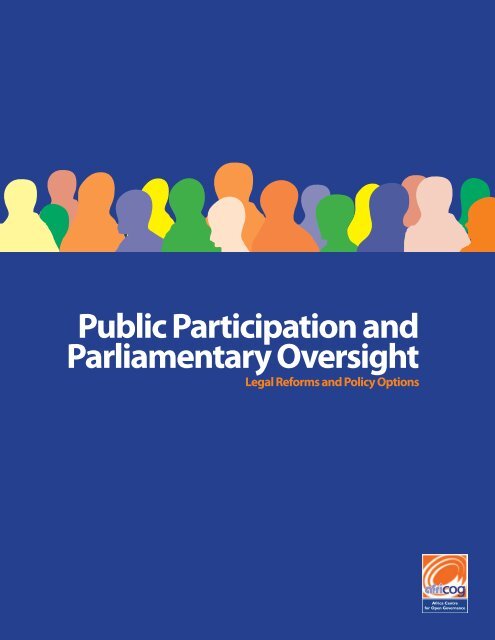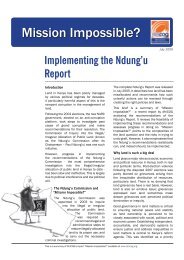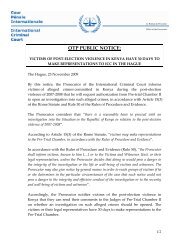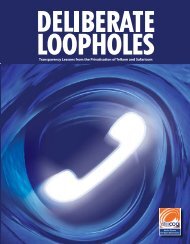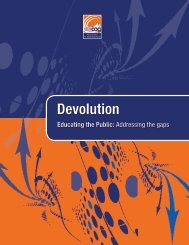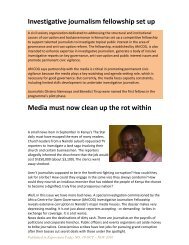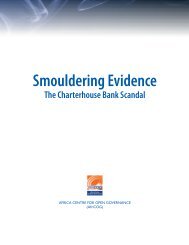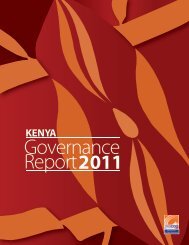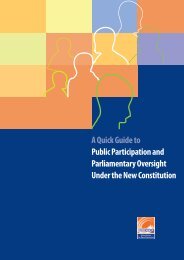Public Participation and Parliamentary Oversight - Africa Centre for ...
Public Participation and Parliamentary Oversight - Africa Centre for ...
Public Participation and Parliamentary Oversight - Africa Centre for ...
Create successful ePaper yourself
Turn your PDF publications into a flip-book with our unique Google optimized e-Paper software.
<strong>Public</strong> <strong>Participation</strong> <strong>and</strong><strong>Parliamentary</strong> <strong>Oversight</strong>Legal Re<strong>for</strong>ms <strong>and</strong> Policy Optionsa
ContentsIntroduction 1The policy question 1Part 1: Context <strong>and</strong> diagnosis 2Part 2: <strong>Parliamentary</strong> committees <strong>and</strong> public participation 3Part 3: Factors that affect the capacities of committees to meaningfully engage the public 5Part 4: Policy <strong>and</strong> legal re<strong>for</strong>ms to promote public participation in oversight committees 8<strong>Africa</strong> <strong>Centre</strong> <strong>for</strong> Open GovernanceP.O. Box 18157-00100, Nairobi,Kenya.Telephone: +254 20-4443707/0737463166Email: admin@africog.orgWebsitr: www.africog.org
IntroductionThe policy questionOne of the most important changes introduced by the2010 Constitution is the enhanced role of the public ingovernance generally <strong>and</strong> in parliamentary processesin particular. There are specific provisions m<strong>and</strong>atingopenness <strong>and</strong> public inclusion in the preamble tothe constitution, 1 explicit affirmation of the constituentpower of the public in the sovereignty clause 2 <strong>and</strong>requirements <strong>for</strong> involvement <strong>and</strong> consultations <strong>for</strong>egroundmost of the chapters. How will this openness<strong>and</strong> participation be given effect, in general? Morespecifically, how will parliamentary committees fulfilthe transparency guarantees <strong>and</strong> public participationrequirements of the constitution?This policy brief analyses the key questions <strong>and</strong> issuesthat need to be addressed. Globally, there is growingrecognition that public participation improves policyoutcomes. 71 of 88 parliaments reviewed in a WorldBank study arranged public hearings. But these are ofvariable depth, scope <strong>and</strong> quality. Some parliamentsroutinely conduct hearings with those affected <strong>and</strong>with experts; other parliaments arrange hearings withgovernment officials <strong>and</strong> yet another group typicallyinvites the public to hearings. Sometimes even thoughhearings are required they are not held. In some parliaments,there is a presumption of the right to be heard<strong>and</strong> in others the matter is at the discretion of the NationalAssembly. But hearings are not the only meansof public participation in parliamentary matters. Other<strong>for</strong>ms of public involvement include:● transmission <strong>and</strong> (re)broadcasts of parliamentaryproceedings;● observation of hearings;● written submissions;● public petitions <strong>and</strong> open proceedings.In Kenya, the new constitution m<strong>and</strong>ates openness,transparency <strong>and</strong> public involvement. But the achievementof this depends on effective implementing legislation;proper administrative structures; nature, number,powers <strong>and</strong> capacities of committees, <strong>and</strong> leadership<strong>and</strong> technical capabilities of parliamentary committees.This brief is in fours parts: the first part provides the legal<strong>and</strong> political context of this question; the secondpart looks at the constitutional foundation <strong>and</strong> natureof the committee system; part 3 at the factors that affectpublic participation <strong>and</strong> part 4 at the legal <strong>and</strong>policy re<strong>for</strong>ms needed to improve public participation.1 Lines 7 <strong>and</strong> 8 of the Preamble.2 Article 10.1
Part 1: Context <strong>and</strong> diagnosisThe Context: The post-election crisis in 2008 drove homethe point that Kenya’s political problems were structurallyembedded in the constitution as it had been implemented<strong>and</strong> denatured through various amendmentsfrom independence. These problems were identified asthe country’s winner-take-all electoral system; frail institutionsunable to mediate intense political competition<strong>and</strong> unaccountable security sector institutions. Theseproblems pointed to the need <strong>for</strong> urgent review of thecountry’s constitution. Under a process embedded inthe old constitution, a new constitution was drafted<strong>and</strong> ratified in a referendum on August 4, 2010. With aturnout of 72.1%, the referendum recorded the highestturnout of any election in the history of Kenya.The new constitution provides a framework <strong>for</strong> undoingKenya’s 40 year authoritarian legacy: powers aresplit <strong>and</strong> balanced under a fully presidential system <strong>and</strong>between a national <strong>and</strong> local government structurebased on counties; the bill of rights has been strengthenedto exp<strong>and</strong> on the previous bill of rights <strong>and</strong> civil<strong>and</strong> political rights have been introduced; the electoralsystem remains constituency-based but there is greaterinclusion of women, marginalised groups <strong>and</strong> theyouth; the security machinery have been placed undergreater constitutional <strong>and</strong> popular scrutiny throughthe elected branches of government; oversight institutionssuch as Auditor General, Controller of Budget,Ethics <strong>and</strong> Integrity Commission <strong>and</strong> the Human RightsCommission have not only been recognised but havealso been given wider powers; revenues are given asounder footing through the constitutional recognitionof the Revenue Allocation Commission; amendmentsto the constitution require much higher threshold <strong>and</strong>some must be approved by referendum. These sweepingchanges are buttressed by broad principles thatguarantee openness <strong>and</strong> scrutiny <strong>and</strong> public access togovernance institutions. Going <strong>for</strong>ward, two key challengesneed to be addressed:● the first is the recognition that there is a big differencebetween the authority that the constitution asserts-as a matter of drafting- <strong>and</strong> that which it willeventually exert- as a matter of implementation;● the second is that many of the changes proposed bythe constitution are not self-executing, they dependon the enactment of enabling legislation.Diagnosis: The 2010 Constitution radically altered theKenyan constitutional system from a dysfunctional hybridof the British parliamentary <strong>and</strong> the American presidentialsystems to an explicitly presidential system. Thenew system is a radical break from what we have had:a president with an electoral m<strong>and</strong>ate independent ofthe electoral m<strong>and</strong>ate of parliament; a bicameral parliamentwith a National Assembly with representativeschosen from single member constituencies supplementedby special seats <strong>for</strong> discrete <strong>and</strong> insular groupsthat are traditionally under-represented <strong>and</strong> a Senatethat represents counties. These changes mean that theuse of the tools <strong>and</strong> mechanisms that Parliament usesto hold government to account must also change. Thetools <strong>for</strong> parliamentary scrutiny of the executive underthe new constitution are a combination of some old<strong>and</strong> new tools. They include:● the parliamentary inquiry;● ad hoc investigations by specially constituted committees;● regular scrutiny by st<strong>and</strong>ing committees;● the parliamentary motions of censure;● the parliamentary debate;● the power to approve or reject appointments;● the power to impeach the President <strong>and</strong>Vice-President; <strong>and</strong>● the power to amend the budget.Under the presidential structure in the new constitution,members of the cabinet will not sit in the NationalAssembly, hence the primary site <strong>for</strong> scrutiny of theexecutive will be the parliamentary committee, not, asbe<strong>for</strong>e, the parliamentary questions asked in plenarysessions.Foundations of the Committee System: The link betweenthe committees of Parliament <strong>and</strong> the public participationis Article 94 of the constitution which explicitly says2
that the “legislative authority of the Republic is derivedfrom the people.” The legislative authority is shared betweenthe Senate <strong>and</strong> the National Assembly whichhave discrete <strong>and</strong> conjoint powers to appoint committeesto discharge Parliament’s m<strong>and</strong>ate. These committeesare established under <strong>and</strong> regulated by St<strong>and</strong>ingOrders which govern both the orderly conduct of businessin the two Chambers <strong>and</strong> also the proceedings ofcommittees.Part 2: <strong>Parliamentary</strong> committees<strong>and</strong> public participation(a) Types of Committees at the National Level:The constitution envisions that to the extent possible,members of the public should be involved as much aspossible in the work of all committees of Parliament.However, it is also clear that the public interest in committeework will depend, in a significant way, on the nature<strong>and</strong> work of the particular committee. <strong>Parliamentary</strong>committees under the constitution will fall into sixbroad categories:1. St<strong>and</strong>ing Legislative Committees: These are permanentcommittees with departmentally relevantm<strong>and</strong>ates <strong>for</strong> scrutinizing government policies. Veryoften, these committees mirror government ministries<strong>and</strong> departments, hence their usual descriptionas departmental committees. All bills affecting suchministries, policy issues related to the ministries aswell as budgets <strong>and</strong> estimates of the departmentsare, in the first place, considered in these committees.These committees are the tools <strong>for</strong> on-goingscrutiny of government. Some permanent legislativecommittees may also be established or be requiredby statute. <strong>Public</strong> participation <strong>and</strong> involvementin the work of such committees is imperative.2. St<strong>and</strong>ing Non-Legislative Committees: These arealso permanent committees but they do not havepolicy relevant departmental responsibilities. Mostof these are committees related to internal affairs ofthe Parliament. These committees often deal withhouse-keeping issues or with the internal managementof the house. They include, <strong>for</strong> instance, theLibrary Committee; the House Business Committee;<strong>Parliamentary</strong> Pensions Committee; the Catering<strong>and</strong> Health Club Committee; Procedure <strong>and</strong> HouseRules Committee; the House Broadcasting Committee<strong>and</strong> the Speaker’s Committee.3. Ad Hoc Committees of Inquiry: These are needbasedcommittees established by resolution of eitherhouse (or both) to address a specific issue underTerms of Reference (ToRs) set out by the house.Though the house does not currently have a committeeof inquiry, it is inevitable that at some pointcommittees of inquiry will be established. Sincesuch committees are usually created to deal withpressing public issues the imperative <strong>for</strong> participationis very high.4. Special Purpose Committees: The clearest exampleof such a committee is the optional committee onimpeachment. The constitution gives the Senate theoption to create a special committee on impeachment.This committee may fall in the generic categoryof ad hoc committee of inquiry, but given theextra-ordinary nature of the impeachment power aswell as the procedural fact that it is, in effect, a trialrather than a parliamentary proceeding, this committeeshould be treated as an ad hoc committee ofinquiry sui generis.5. Joint Committees: The constitution also gives theNational Assembly <strong>and</strong> the Senate the discretionarypower to create joint committees. The m<strong>and</strong>ates ofsuch committees will be in the instrument that cre-3 Article 112.3
ates them. But examples of joint committees wouldinclude mediation committees 3 which are created toresolve issues on which the houses are deadlocked.6. Sub-committees of <strong>Parliamentary</strong> Committees:Under the St<strong>and</strong>ing Orders committees may appointsub-committees to assist in the discharge oftheir functions. To pass constitutional muster, suchsub-committees should be subject to the sametransparency <strong>and</strong> participation requirements as themain committees.(b) <strong>Public</strong> <strong>Participation</strong> <strong>and</strong> the Committee System:Under the centralised, prefectural administration establishedby the post-independence constitution, publicparticipation <strong>and</strong> inclusion were virtually non-existent.The public participation <strong>and</strong> inclusion requirements ofthe new constitution are designed to remedy this defect.So central is this public involvement theme to thenew dispensation that the constitution makes it clearthat public participation is a requirement not merely ofthe electoral process but an ethos of the entire governmentsystem established by law. There are four specificareas in which it is m<strong>and</strong>ated <strong>and</strong> one omnibus transparencyrequirement:1. There is a general constitutional duty on Parliament<strong>and</strong> County Assemblies to involve the public: Theconstitution – under Article 118 <strong>and</strong> 196- imposeson Parliament <strong>and</strong> County Assemblies respectivelyboth a positive <strong>and</strong> a negative duty: the positiveduty requires the involvement of the public <strong>and</strong> thenegative duty bars the exclusion of the public fromproceedings of Parliament <strong>and</strong> County Assembliesor the proceedings of their committees. 42. In matters of public finance: The provisions on publicfinance articulate principles of “openness <strong>and</strong>accountability.” Under this, the constitution has imposeda requirement of “public participation in financialmanagement.” 53. In the delivery of service by the public service: Underthe values <strong>and</strong> principles <strong>for</strong> the managementof the public service, the constitution requires “involvementof the people in the process of decisionmaking”<strong>and</strong> also “transparency <strong>and</strong> provision to thepublic of timely, accurate in<strong>for</strong>mation”. 64. In environmental husb<strong>and</strong>ry: Provisions on themanagement of natural resources, contained in thechapter on the management of public l<strong>and</strong>, requirethe State to “encourage public participation in themanagement, protection, <strong>and</strong> conservation of theenvironment.” 75. General transparency guarantees: The purpose oftransparency guarantees is to protect the opennessof public decision-making processes. Key to theseguarantees is access to in<strong>for</strong>mation in a relevant <strong>and</strong>usable <strong>for</strong>m. Access to in<strong>for</strong>mation is a fundamentalhuman right in Article 35 which provides that everycitizen has a right to access in<strong>for</strong>mation held by theState, <strong>and</strong> to access in<strong>for</strong>mation held by anotherperson <strong>and</strong> required <strong>for</strong> the exercise or protectionof any right or fundamental freedom. The provisionalso obliges the State to “publish <strong>and</strong> publicize anyimportant in<strong>for</strong>mation affecting the nation.” Transparencyguarantees are embedded in many othersubstantive provisions of the constitution: the provisionson the management of public l<strong>and</strong> include4 Article 118 specifically provides under sub-section (1) that “Parliament shall conduct its business in an open manner, <strong>and</strong> its sittings <strong>and</strong> those of its committees shall be opento the public; <strong>and</strong> facilitate public participation <strong>and</strong> involvement in the legislative <strong>and</strong> other business of Parliament <strong>and</strong> its committees. Under sub-section (2) the constitutionprovides that “Parliament may not exclude the public, or any media, from any sitting unless in exceptional circumstances the relevant Speaker has determined that there arejustifiable reasons <strong>for</strong> the exclusion.” Article 196 (1) <strong>and</strong> 2 re-iterate the same strictures with reference to County Assemblies.5 Article 201 (c).6 Article 232 (1).7 Article 69 (1) (d).4
principles of “transparency <strong>and</strong> accountability <strong>and</strong>cost effective administration;” 8 those on representationof the people require elections to be “transparent;”9 procurement is required to be “transparent,” 10<strong>and</strong> there is a general duty on Parliament to enactlaws that ensure “both expenditure control <strong>and</strong>transparency” in all governments. 116. In addition, devolution is a means of enabling participation:In terms of institutional design, the constitutionm<strong>and</strong>ates decentralisation <strong>and</strong> explicitlystates the objectives of devolution to include “thedemocratic <strong>and</strong> accountable exercise of power” <strong>and</strong>the desire “to give powers of self governance to thepeople <strong>and</strong> enhance the participation of the peoplein the exercise of power of the State <strong>and</strong> in makingdecisions affecting them.” 12 A related objective isto “recognize the right of communities to managetheir own affairs” 13 <strong>and</strong> “to protect <strong>and</strong> promote theinterests <strong>and</strong> rights of minorities.” 14Part 3: Factors that affect thecapacities of committees tomeaningfully engage the public(a) Internal capacities of committees: <strong>Parliamentary</strong>committees suffer from inadequate staffing levels.Though the <strong>Parliamentary</strong> Service Commissionhas been implementing re<strong>for</strong>ms to strengthen theresearch <strong>and</strong> analysis capabilities of parliamentarycommittees, staffing levels remain low. Withoutadequate staff – in numbers <strong>and</strong> skills- committeework tends to be slow, which undermines overalleffectiveness <strong>and</strong> erodes the meaningfulness ofpublic participation, since public input cannot beprocessed sufficiently or effectively. Improved staffingneeds to be rigorously linked to size, typologies,membership, composition, m<strong>and</strong>ate <strong>and</strong> investigatoryrequirements of specific committees. In addition,changes in the reporting mechanisms, thedrafting of quality reports <strong>and</strong> implementation ofparliamentary resolutions are also necessary.(b) Infrastructure of committees: The physical infrastructureavailable to committees has had a constrainingeffect on public participation. Only the<strong>Public</strong> Accounts Committee <strong>and</strong> <strong>Public</strong> InvestmentsCommittee have designated meeting rooms, theother committees have to share the few committeerooms available. The exp<strong>and</strong>ed nature of the legislaturewill put more strain on the physical infrastructure,although expansion to meet the needs of thenew constitution will also provide opportunities <strong>for</strong>addressing the infrastructure needs of the legislature.(c) Number of committees: Kenya’s legislature has morethan 30 committees, some of which were createdout of previously larger committees. For example,1983 amendments to the St<strong>and</strong>ing Orders split the<strong>Public</strong> Accounts Committee into two: a leaner, 10member <strong>Public</strong> Accounts Committee <strong>and</strong> a new<strong>Public</strong> Investments Committee. However, in light ofthe new constitution, new st<strong>and</strong>ing orders are beingprepared <strong>and</strong> the committee system needs to be rationalisedto reflect the wider powers of Parliamentas well as the new functions <strong>and</strong> roles. Comparativein<strong>for</strong>mation from other jurisdictions can in<strong>for</strong>mdecision-making in Kenya: the House of Commonshas 34 Select Committees <strong>and</strong> between them, the8 Article 60 (1) (d).9 Article 81.10 Article 227 (1).11 Article 225 (2).12 Article 174 (c).13 Article 174 (d).14 Article 174 (e).5
two houses of the United Kingdom’s Parliamenthave 100 committees of which fourteen are JointCommittees. The US House of Representatives has25 committees while the Ug<strong>and</strong>a Parliament has 25.The South <strong>Africa</strong> National Assembly has a total of 34committees whilst the National Council of Provinceshas 13, <strong>for</strong> a total of 47 committees. Thus, numbersvary widely across legislatures <strong>and</strong> it would seemthat the key issue is to make sure that all aspectsof parliamentary work are covered. However, it isclear that more committees will definitely be necessary<strong>and</strong>, as important, under the new dispensationmore committees will create more opportunities <strong>for</strong>public participation.(d) Support <strong>and</strong> cooperation of government agencies:One factor that has sapped the per<strong>for</strong>mance of parliamentarycommittees has been lack of supportfrom the government. However, the new constitutionhas trans<strong>for</strong>med the role of Parliament <strong>and</strong>given it more powers than be<strong>for</strong>e especially in theareas of oversight <strong>and</strong> budget. Now, more than be<strong>for</strong>e,Parliament will rely heavily on the co-operationof government agencies if it is to play its rightful rolein relation to, especially, the budget process. Changesto existing laws, especially the Official Secrets Act<strong>and</strong> the National Assembly (Privileges <strong>and</strong> Immunities)Act are necessary. Both laws bar public officialsfrom disclosing in<strong>for</strong>mation to Parliament. However,it is clear that the omnibus <strong>and</strong> vague provisions ofthe Official Secrets Act do not square with the transparencyguarantees of the new constitution <strong>and</strong>,whilst there may be a legitimate national securityinterest in certain non-disclosure, it is evident thatthe Official Secrets Act goes too far.(e) Integrity issues: An effective committee systemdepends on effective leadership <strong>and</strong> strong ethicalgrounding. The current committee system ofthe National Assembly of Kenya <strong>and</strong> the Assemblyitself have been described as “prone to kickbacks” 15 ,<strong>and</strong> the process of the writing <strong>and</strong> adopting of keycommittee reports, “the most lucrative” 16 part of thiskick-back system. A recent report of a study by theKenya chapter of Transparency International singlesout ‘abuse of committee trips’ 17 citing the large sizesof delegations, poor management of the trips, illogical<strong>and</strong> expensive routing <strong>and</strong> the sheer embarrassmentthese trips have occasioned to the Assembly<strong>and</strong> the country. 18 The report also cites an existing‘reward system’ in the composition of committees<strong>and</strong> abuse of office by members of investigatorycommittees through harassing public officials <strong>and</strong>soliciting favours. There have been allegations of toomuch flirtation between some chairs of committees<strong>and</strong> representatives of special interests <strong>and</strong> officialsof transnational corporations when legislative measuresaffecting the interests of the latter are be<strong>for</strong>eParliament. 19 There are also allegations of rampanthorse-trading in these committees where MPs agreeto do one thing or another to further their personal,business or other vested interests. Complaints <strong>and</strong>allegations of impropriety within committees <strong>and</strong>threats on lives of members are arising more fromlegislators than from the public. Members are publiclyalleging that colleagues are openly engaging inbribe-taking <strong>and</strong> illicit relations with individuals beingprobed by committees of the House. This seemsto lend credence to the adverse media reports <strong>and</strong>may have a negative impact on the integrity of thecommittees <strong>and</strong> Parliament as a whole.15 Transparency International (Kenya), “A Report on Integrity: A Study of the Kenyan Parliament” March 2010, p. 6.16 “Bribery in Kenya’s Parliament,” The Daily Nation, 19 May 2009.17 Transparency International (Kenya), A Report on Integrity, Op. cit. p. 35.18 Ibid.19 Migai Akech, ‘Abuse of Power <strong>and</strong> Corruption in Kenya: Will the New Constitution Enhance Government Accountability?’, Indian Journal of Global Legal Studies (Vol. 18 # 1), p. 2.6
(f ) Time available <strong>for</strong> consideration of matters underminesquality: The number of legislative <strong>and</strong> policymeasures that committees have to address is immense,reducing the amount of time available <strong>for</strong>doing so effectively. There is, there<strong>for</strong>e, inadequatescrutiny of bills <strong>and</strong> policy proposals going be<strong>for</strong>ecommittees. Consequently, their quality cannot alwaysbe assured. Shortage of time impairs the abilityof committees to effectively engage the public.Though many of the challenges related to time area result of growing workload, some are a result ofa poorly structured committee system in terms ofhow the work <strong>and</strong> hearings are organised. Manycommittee hearings are too focused on scoringpolitical points. Allegations of corruption againsta government agency in the media are often theoccasion <strong>for</strong> the immediate launch of committeeinvestigations. Given that allowances are paid <strong>for</strong>these sittings, the incentive structure clearly encouragesmore rather than less of these “fishing investigations.”A more effective approach would entail anexpert investigation- say undertaken by the AuditorGeneral- followed by a committee hearing withpublic participation on the findings of such an expertinvestigation.(g) Gaps in the infrastructure of participation: Thecase of delegated legislation: Delegated legislationsaves on parliamentary time by vesting executiveagencies with rule-making powers. Delegatingrule-making powers to such agencies allows themto address technical or detailed issues not appropriate<strong>for</strong> primary legislation; it provides flexibility <strong>for</strong>amendment especially if the measures proposed areof a short-term nature <strong>and</strong> promotes experimentation,since the rules can be easily amended if dysfunctional.However, there is a major democraticdeficit in the process of delegated legislation: firstly,there is less parliamentary scrutiny of delegated legislation;secondly, delegated legislation, in effect,transfers legislative authority to the executive, potentiallyeroding separation of powers <strong>and</strong> finally, itprovides opportunities to circumvent the will of thelegislature.Under the old constitution, no specific provision <strong>for</strong>parliamentary scrutiny of delegated legislation existed.Article 94 (6) of the new constitution cures thisdefect. It provides <strong>for</strong> the control of delegated legislationby requiring any “Act of Parliament or countylegislation delegating the power to make bindinglegislation” to “expressly specify the purpose <strong>and</strong> objectives<strong>for</strong> which that authority is conferred, the limitsof the authority, the nature <strong>and</strong> scope of the lawthat may be made, <strong>and</strong> the principles <strong>and</strong> st<strong>and</strong>ardsapplicable to the law made under the authority.” Thisprovision meets the criticism around the democraticdeficit inherent in delegated legislation. Unlike theSouth <strong>Africa</strong>n constitution which specifically requiresthat delegated legislation be accessible <strong>and</strong>that it be tabled in Parliament, the Kenyan constitutiondoes not specifically require accessibility ofsubsidiary legislation, but this requirement is neverthelessimplicit in the requirements <strong>for</strong> transparency<strong>and</strong> public participation.There are three key issues involving delegated legislation:1. There is no systematic mechanism <strong>for</strong> review of subsidiarylegislation to ensure that it complies with theprimary legislation. The implication is that the constitutionalityof delegated legislative powers cannotbe assured.2. There is no constitutional provision on the scrutinyof subsidiary legislation. An inherent review power isthe requirement that all subsidiary legislation mustcomport with the primary legislation. The Interpretation<strong>and</strong> General Provisions Act, however, providesthat if a resolution is passed by the Assembly, withintwenty days on which it next sits after the rule orregulation is laid be<strong>for</strong>e it, that the rule or regulationbe annulled, it shall thence<strong>for</strong>th be void. However,this will not affect anything already done under therule or the power to make fresh rules.3. There is no statutory definition of delegated legislation.In South <strong>Africa</strong>, <strong>for</strong> instance, the constitutionrequires the scrutiny of proclamations, regulations,<strong>and</strong> rules. Questions have arisen whether proclamations<strong>for</strong>m part of delegated legislation. This is im-7
portant because ministers have been appointingpersons to public office through proclamations inthe Kenya Gazette. If the proclamations <strong>for</strong>m part ofsubsidiary legislation, it follows that they can be reviewedby the legislature. If not, there is no obviousmechanism <strong>for</strong> their review.Part 4: Policy <strong>and</strong> legal re<strong>for</strong>msto promote public participationin oversight committeesParts 1 to 3 have identified the issues that impact onpublic participation in the work of committees of Parlia-ment. This part looks at the different <strong>for</strong>ms that participationtakes <strong>and</strong> the re<strong>for</strong>ms needed to improve thatparticipation.What the appropriate type of participation is, dependson the nature <strong>and</strong> purpose of the committee. Committeeswith a general legislative <strong>and</strong> policy m<strong>and</strong>ate,such as departmental committees, will be differentfrom special purposes committees such as a senatorialcommittee on impeachment, which is in effect a trial.<strong>Participation</strong> may entail submissions, evidence giving<strong>and</strong> observation in the <strong>for</strong>mer, but perhaps only observationin the latter. The table below outlines the various<strong>for</strong>ms that participation takes in different types of committees.(a) Approaches to participation in <strong>Oversight</strong> CommitteesType of committee Nature of m<strong>and</strong>ate Scope of public involvement Tools <strong>for</strong> public participationSt<strong>and</strong>ing LegislativeScrutiny of departmental Open hearingsWritten submissionsCommitteespolicies, budgets <strong>and</strong> billsSt<strong>and</strong>ing Non-LegislativeCommitteesAd Hoc Committees ofInquirySpecial Purpose CommitteesJoint CommitteesSub-Committees of<strong>Parliamentary</strong> CommitteesInternal parliamentary businessDetermined by resolution of thehouseDetailed in law e.g.Constitutional Implementation<strong>Oversight</strong> CommitteeOptional Committee onImpeachment;Determined by joint resolutionestablishing the committeeDetermined by decision ofparent committeeRight to observe, give evidence<strong>and</strong> offer viewsOpen hearings; right to observe<strong>and</strong> offer viewsOpen hearings; limited closedhearingsOpen hearings; right to observe<strong>and</strong> offer viewsOpen hearings; right to observelimited closed hearingsOpen hearings; right to observe<strong>and</strong> offer viewsPresumption that same rulesof participation as parentcommittee applyOral presentations; expertopinions; public petitions;<strong>Public</strong> broadcasts.Written submissions; oralpresentations<strong>Public</strong> broadcastsWritten submissions; expertopinion; public petitions; publicbroadcasts (or rebroadcasts withredactions in case of closedhearings)Written submissions; expertopinion; public broadcasting;public petitions<strong>Public</strong> broadcastingRebroadcast with redactions inthe case of closed hearings<strong>Public</strong> broadcasting; writtensubmissions; expert opinions;public petitions.Presumption that same toolsas those <strong>for</strong> parent committeeapply.May vary according to subjectmatter (say public security)8
(b) Re<strong>for</strong>ms to improve participationAs the table above indicates, there is both ample scope<strong>for</strong> public participation in virtually all committees ofParliament <strong>and</strong> a wide range of tools <strong>for</strong> the public toparticipate. However, <strong>for</strong> this participation to be effectivea number of re<strong>for</strong>ms are necessary.1. General Principles of <strong>Public</strong> Access <strong>and</strong> <strong>Participation</strong>:In order to ensure that parliamentary processesare open to scrutiny, the on-going amendments ofthe St<strong>and</strong>ing Orders ought to include general principlesof openness. Such principles would include:i. The presumption of open committee hearings: In theabsence of specific <strong>and</strong> compelling constitutionalor legal basis <strong>for</strong> confidentiality or secrecy, all committeehearings shall be open to public observation<strong>and</strong> participation;ii. The principle of limited disclosure of confidentialreports: Even committee meetings that are confidentialshall be recorded <strong>and</strong> if appropriate, thoserecordings shall- to the extent possible- be releasedto the public with the secret or confidential in<strong>for</strong>mationredacted as appropriate;iii. The presumption of access to minority reports:Where a minority group within a committee writesa minority report dissenting from the conclusionsof the majority, the minority report shall be a publicdocument;iv. The right to know the basis of classification of in<strong>for</strong>mation:When a government agency declares certainin<strong>for</strong>mation classified <strong>and</strong> there<strong>for</strong>e not accessibleto any committee, Parliament <strong>and</strong> the publichave a legitimate need to know: a) the basis of theclassification; b) the duration of the classification<strong>and</strong> c) the level of the classification (whether “TopSecret,” “Secret” or “Restricted.”).2. Access to in<strong>for</strong>mation: <strong>Public</strong> participation <strong>and</strong>engagement with the legislature depend on theamount <strong>and</strong> quality of in<strong>for</strong>mation available to thepublic, both as to the inner workings of the legislature<strong>and</strong> the general government. As pointed outearlier, quite apart from the constitutional provisionson access to in<strong>for</strong>mation, Parliament has specificconstitutional obligations to ensure public participationin its affairs. The implicit pre-condition <strong>for</strong> thedischarge of this obligation is the requirement thatthe administration of Parliament provide the publicwith the in<strong>for</strong>mation that will facilitate that participation.With a view to meeting the obligation as topublic participation, the legislature needs to addressexisting limitations on access to in<strong>for</strong>mation withinthe legislature. These limitations are both legal <strong>and</strong>technological.9
i. Legal issues: The most serious legal limitation onaccess to in<strong>for</strong>mation is in the National Assembly(Powers <strong>and</strong> Privileges Act). Under sections 17 20<strong>and</strong> 18 21 the Act allows withholding of in<strong>for</strong>mation.Under section 17 a person called to give evidencebe<strong>for</strong>e a committee may refuse to produce suchevidence on the ground that “it is of a private nature”.However, Article 35 of the constitution whichprovides <strong>for</strong> access to in<strong>for</strong>mation now allows <strong>for</strong>access to private in<strong>for</strong>mation if such in<strong>for</strong>mation isneeded to claim a right. Under section 18, publicofficers face two types of restrictions on giving evidenceto committees. First, they may not produceany evidence in Parliament on military matterswithout the consent of the president. Second, theymay not give out any correspondence or other evidenceaffecting the public service which the presidenthas directed not to be produced. These provisionsas well as section 20 of the Act - which saysthat questions of admissibility of evidence will bedecided on the prevailing practices of the Houseof Commons- are clearly inconsistent with the clearlanguage in the constitution, its open governmentethos <strong>and</strong> its explicit transparency guarantees; itthere<strong>for</strong>e needs to be amended.ii. Technology <strong>and</strong> transparency: Over the last decade,the Kenyan Parliament has been implementingmeasures to improve openness, participation <strong>and</strong>public scrutiny of parliamentary business. Criticalmilestones in these ef<strong>for</strong>ts include:● the introduction of the live coverage of parliamentaryproceedings by the media;● the 2008 amendments to open up the proceedingsof the committees of the House to public attendance<strong>and</strong> to introduce a simplified procedure<strong>for</strong> public petitions; <strong>and</strong>● the increased use of technology in the conduct ofits business which eventually resulted in a website,onto which important basic in<strong>for</strong>mation hasbeen uploaded, allowing members of the publiceasier access to parliamentary business.These re<strong>for</strong>ms were rein<strong>for</strong>ced in July 2009 whenthe National Assembly announced an agreementwith a service provider to offer digital solutions toMembers of Parliament <strong>and</strong> to train them in theuse of in<strong>for</strong>mation technology. Individual membershave set the pace <strong>for</strong> the future. For instance, whenthe current Speaker, Kenneth Marende, representedEmuhaya constituency in Parliament he maintaineda blog that served as a plat<strong>for</strong>m <strong>for</strong> interaction withhis constituents. Today that same blog is now a <strong>for</strong>um<strong>for</strong> the public to interact with the Speaker.20 Section 17 says that:(1) Where any person ordered to attend to give evidence or to produce any paper, book, record or document be<strong>for</strong>e the Assembly refuses to answer any question that may beput to him or to produce the paper, book, record or document on the ground that it is of a private nature <strong>and</strong> does not affect the subject of inquiry, the Speaker may excusethe answering of the question or the production of the paper, book, record or document, or may order the answering or production thereof.(2) Where any person ordered to attend or to give evidence or to produce any paper, book, record or document be<strong>for</strong>e any committee refuses to answer any question that maybe put to him or to produce the paper, book, record or document on the ground that it is of a private nature <strong>and</strong> does not affect the subject of inquiry, the chairman of thecommittee may report his refusal to the Speaker with the reasons there<strong>for</strong>; <strong>and</strong> the Speaker may thereupon excuse the answering of the question or the production of thepaper, book, record or document, or may order the answering or production thereof.21 Section 18 says that:(2) Except with the consent of the President, no public officer shall -(a) produce be<strong>for</strong>e the Assembly or a committee any paper, book, record or document; or(b) give evidence be<strong>for</strong>e the Assembly or a committee, relating to the correspondence of any naval, military or air <strong>for</strong>ce matter, nor shall secondary evidence be received by orproduced be<strong>for</strong>e the Assembly or a committee of the contents of any such paper, book, record or document.(3) Except upon the direction of the President, no public officer shall refuse -(a) to produce be<strong>for</strong>e the Assembly or a committee any paper, book, record or document; or(b) give evidence be<strong>for</strong>e the Assembly or a committee, relating lo the correspondence of any civil department or to any matter affecting the public service; <strong>and</strong> secondaryevidence shall not be received by or produced be<strong>for</strong>e the Assembly or a committee of the contents of any such paper, book, record or document which the President hasdirected shall not be produced.10
Other re<strong>for</strong>ms have moved apace: The National AssemblyHouse Live Broadcast project has exp<strong>and</strong>ed withthe Kenya Communications Commission granting theNational Assembly broadcast licences with the expectationthat, eventually, the National Assembly’s ownmedia corps will take responsibility <strong>for</strong> the live coverage.22 Though these re<strong>for</strong>ms are steps in the right direction,more needs to be done:Make the online resources interactive: Though thewebsite is up <strong>and</strong> running, the online resources arenot interactive. Parliament can leverage technologyto improve the level of interaction between members<strong>and</strong> committees, on the one side, <strong>and</strong> the public<strong>and</strong> Parliament on the other.User-friendly access: Though some good contentexists on the National Assembly’s site, these onlineresources are not always user-friendly to access <strong>and</strong>content developers, editors <strong>and</strong> copy-writers needto be recruited to improve access through betternavigation aids <strong>and</strong> easier to digest presentationstyle. In addition, even though the National Assemblyhas put out a large amount of in<strong>for</strong>mation, oftenthe contextual in<strong>for</strong>mation needed to allow readers<strong>and</strong> followers to make sense of the posted in<strong>for</strong>mationis missing. In this regard, more background in<strong>for</strong>mation,perhaps in a simplified version, would goa long way towards improving public access to <strong>and</strong>public underst<strong>and</strong>ing of the affairs of the legislature.Improve outreach <strong>and</strong> communication: The opengovernment requirements of the new constitutionoblige Parliament to take measures to increaseawareness <strong>and</strong> opportunities <strong>for</strong> public participationthrough proactive outreach programmes.3. On integrity issues: Allegations of integrity failuresof individual members are a blot on the per<strong>for</strong>manceof the Parliament <strong>and</strong> if not addressed, willeventually sap public confidence in the legislature.Though MPs- <strong>and</strong> Senators- will have a general immunityfrom prosecution <strong>and</strong> no civil or criminalproceedings may be instituted against any member<strong>for</strong> words spoken be<strong>for</strong>e, or written in a report to,the Assembly or a committee, it is a criminal offence<strong>for</strong> a member or a senator to accept or receive anybribe, gift or reward so as to promote any matterbe<strong>for</strong>e the Assembly, the Senate or any committee.However, the penal provisions of the <strong>Public</strong> OfficerEthics Act – which also cover Members of Parliament,are weak. What is currently lacking are effectivetools <strong>for</strong> identifying <strong>and</strong> rooting out bribery <strong>and</strong>related claims. Questions of integrity are politicized<strong>and</strong> the <strong>Parliamentary</strong> Service Commission is inappropriateas an oversight mechanism <strong>for</strong> policingintegrity. To close the gaps in the current system thefollowing re<strong>for</strong>ms are proposed:i. Alignment of relevant laws with Chapter 6 of theConstitution: In order to comply with Chapter 6 requirements,the Privileges <strong>and</strong> Immunities Act, the<strong>Public</strong> Officer Ethics Act <strong>and</strong> the St<strong>and</strong>ing Ordersneed to be amended to strengthen disclosures <strong>and</strong>the way in which members’ interests are reported<strong>and</strong> scrutinized. These amendments should alsospecify penalties <strong>for</strong> non-compliance.ii. Register of Members’ Interests: A register of members’interests should be opened <strong>and</strong> all membersof the National Assembly <strong>and</strong> Senators should beobliged to state their assets as well as companies inwhich they or their interests have interests.22 By introducing live media coverage of its proceedings, Kenya joined 60 other countries around the world that have enabled media coverage of parliamentary proceedings. See,Mwaura Kimani, Kenya: Parliament ushers in the Era of TV Live Coverage, http://allafrica.com/stories/200806231976.html (June 2008).11
iii. Gifts to Members: Gifts to members of a specifiedvalue should be reportable <strong>and</strong> of a higher thresholdprohibited. In particular, private companies’sponsorship of parliamentary activities should beprohibited as a “corrupt practice.”iv. House Ethics Committee: A House as well as SenateCommittee on member’s ethics - which is presumptivelyopen to the public- should be established <strong>and</strong>members of the public should have the right to petitionit when there is credible basis <strong>for</strong> impugningthe integrity of a particular Member of Parliament.4. On physical <strong>and</strong> institutional infrastructure: There-organization of Parliament to take account ofthe new constitution must include the developmentof physical facilities to meet the needs of thelegislature. Two areas are especially critical: provisionof adequate facilities <strong>for</strong> both the National Assembly<strong>and</strong> the Senate <strong>and</strong>; provision of suitable<strong>and</strong> accessible space <strong>for</strong> all committees as well assub-committees.The physical requirements of the House should besupplemented with adequate human <strong>and</strong> institutionalskills. Committees must be supported toeffectively receive, analyze <strong>and</strong> work on the submissionsthat come from the public, experts <strong>and</strong>government departments. In particular, committeehearings should include report-back requirementson the nature <strong>and</strong> scope of public consultations thathave taken place on any specific measures consideredby each committee.5. On government support <strong>for</strong> committees, especiallyon fiscal matters: The new fiscal managementprocess is modeled on that of the United Statesof America. This means that, though the <strong>for</strong>mal responsibility<strong>for</strong> drafting the budget remains withthe Minister <strong>for</strong> Finance, Parliament will drive thebudget process. To discharge this burden, Parliamenthas established the Budget Office, which hasa core of technical staff to support parliamentarycommittees in scrutiny <strong>and</strong> <strong>for</strong>mulation of counter-proposals.The Speaker will play an importantrole in regulating this new relationship betweenthe two arms of government <strong>and</strong> in order to do soon an in<strong>for</strong>med basis, he or she needs to receivespecific support in this regard. To ensure that thisprocess works as constitutionally envisioned, thefollowing measures are proposed:i. Appointment of a high-level advisor <strong>for</strong> the Speaker:The responsibility of the advisor is to complementthe role of the Clerk in assisting the Speaker in underst<strong>and</strong>ing<strong>and</strong> playing a role in the interface betweenthe government <strong>and</strong> the National Assemblywith regard to fiscal management.ii. Directive to government departments to comply withparliamentary orders: Be<strong>for</strong>e the next elections in2013, the government should issue a general directiveto all government departments on the ramificationsof the new constitutional dispensation on thebudget process <strong>and</strong> spell out their responsibilitiestowards Parliament generally <strong>and</strong> towards parliamentarycommittees in particular.iii. Fiscal management focal point: The <strong>Parliamentary</strong>Budget Office should establish <strong>and</strong> adequatelyequip a Fiscal Management Focal Point to lead theprocess of budget hearings. Working with both theBudget Office <strong>and</strong> the various departmental committees,the Fiscal Management Focal Point will coordinatethe Budget Office’s programme of publicconsultations <strong>and</strong> hearings.12
6. Improving public <strong>and</strong> parliamentary scrutiny ofdelegated legislation: The gaps in the scrutiny ofdelegated legislation <strong>and</strong> the resulting democraticdeficit highlight the urgent need <strong>for</strong> a mechanism tosystematically review delegated legislation againstthe law-making powers contained in the relevantprimary legislation. The necessary re<strong>for</strong>ms in this regardinclude the following:i. Scope of coverage: The definition of subsidiary legislationis now urgent. Whether this will includeministerial proclamations <strong>and</strong> directives should beclarified either through the relevant primary legislationor, more generally, through amendments to theInterpretation <strong>and</strong> General Provisions Act, Chapter 2,the Laws of Kenya.ii. Providing access to subsidiary legislation: Thoughpublic access to subsidiary legislation is not directlyrequired by the constitution, the Interpretation <strong>and</strong>General Provisions Act provides that “all rules <strong>and</strong>regulations made under an Act shall, unless a contraryintention appears in the Act, be laid be<strong>for</strong>e theNational Assembly without unreasonable delay.” Thisprovision, together with the transparency guaranteesof the constitution suggest that it is necessaryto furnish a mechanism <strong>for</strong> public scrutiny of subsidiarylegislation. This can be done in two measures:a. An appropriate amendment of the Interpretation<strong>and</strong> General Provisions Act that provides <strong>for</strong> a onemonth public commentary period be<strong>for</strong>e subsidiarylegislation comes into <strong>for</strong>ce.b. An on-line parliamentary index of all subsidiary legislationas a reference point on the available subsidiarylegislation.iii. Scrutiny of subsidiary legislation: Though a comprehensivereview of all subsidiary legislation isnot feasible at this point, a number of intermediatesteps short of an overhaul are possible <strong>and</strong> shouldbe adopted. These would include the following:a. Parliament should establish whether the subsidiarylegislation currently in <strong>for</strong>ce was laid be<strong>for</strong>e theHouse as required by law <strong>and</strong> if not, require that it beso laid.b. On an annual basis, the office of the Clerk, legislativeservices, should provide an index showing the dateson which subsidiary legislation was laid be<strong>for</strong>e theHouse. This will allow interested people to independentlymonitor compliance with this legal requirement,<strong>and</strong> to effect scrutiny.c. As in South <strong>Africa</strong>, the Interpretation <strong>and</strong> GeneralProvisions Act, should provide <strong>for</strong> the legislative reviewof proclamations made under subsidiary legislation.In practice, this issue has arisen when authorities,such as ministers, have purported to exercisepowers under primary or subsidiary legislation tomake appointments to public office, or decide ondates <strong>for</strong> the happening of a given event. One suchcase was the controversial appointment by the Presidentof Mr. Justice Aaron Ringera <strong>for</strong> his second termas Director of the Kenya Anti-Corruption Authority.Although the Legal Affairs Committee entertainedthe matter, it had no clear legal m<strong>and</strong>ate to do so.It would be useful if this m<strong>and</strong>ate was clearly providedthrough an amendment of the Interpretation<strong>and</strong> General Provisions Act.d. Finally, the rules of court made by the Chief Justiceor the Rules Committee should be available<strong>for</strong> wider public scrutiny. A special procedure thatpreserves the autonomy of the judiciary as an independentinstitution but also allows parliamentary<strong>and</strong> public scrutiny of the rules should be designed<strong>and</strong> operationalized.7. <strong>Public</strong> access <strong>and</strong> participation in devolved governments:The principles of openness <strong>and</strong> participationas well as the re<strong>for</strong>ms proposed in this briefapply- with appropriate modifications, based on theconstitutional m<strong>and</strong>ates of county governments, tocommittees of County Assemblies.13
<strong>Public</strong> <strong>Participation</strong> <strong>and</strong><strong>Parliamentary</strong> <strong>Oversight</strong>Legal Re<strong>for</strong>ms <strong>and</strong> Policy OptionsAcknowledgmentAfriCOG thanks team members Charles Wanguhu, Michael Orwa, Maureen Kariuki, Beatrice Odallo, Anyona Obutu, Carole Theuri,Shwetaketu Radia, Stephanie Wairimu, Kadenge Kidiga, Noreen Wahome <strong>and</strong> Maureen Gachomo <strong>for</strong> their commitment to ourwork.AfriCOG also thanks Wachira Maina, Kipkemoi arap Kirui, George Kegoro <strong>for</strong> their contribution to our parliamentary work.The publication of this report is made possible by the support of the American <strong>and</strong> British people through the United StatesAgency <strong>for</strong> International Development (USAID) <strong>and</strong> Department <strong>for</strong> International Development (DFID).We are also grateful to the Open Society Initiative <strong>for</strong> East <strong>Africa</strong> (OSIEA) <strong>for</strong> their support to our work.The views expressed in this report are those of AfriCOG alone <strong>and</strong> do not necessarily reflect the views of USAID, UKAID, DFID orSUNY Kenya.September 2012


